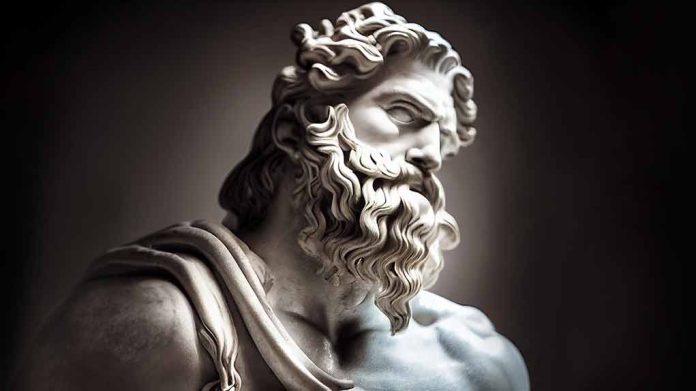
Uranus is one of the outer planets in our solar system and in astrology. It’s associated with innovation, uniqueness, technology, revolution, and change. As always, planets are discovered as we need them to explain changes to our human evolution. In the case of Uranus, the planet was discovered in 1781 while the Industrial Revolution was gaining steam and we were in the throes of the American and French Revolutions as well.
Cool Uranus Facts
Uranus is the seventh planet from the sun in our solar system. He orbits the sun just outside of Saturn, making it a transpersonal planet. It takes nearly a lifetime, 84 years, for Uranus to travel around the sun, and he stays in each astrological sign for seven years.
It’s a pretty unique planet, with some interesting features that set it apart from the rest of the gang. This makes sense, since Uranus rules all things “weird.”
One of the most noticeable things about Uranus is its tilted axis. While most planets in our solar system have a tilt of less than 30 degrees, Uranus is tilted at a whopping 98 degrees! That means its axis is almost parallel to its orbital plane, which causes some pretty wild seasonal changes. Seasons on Uranus last about 20 earth years.
It’s a gas giant, like Jupiter and Saturn, but it’s made up of different types of gasses than they are. Uranus is mostly composed of hydrogen and helium, like the other gas giants, but it also has a lot of ices, made of water, ammonia, and methane. In fact, it’s the only planet in our solar system that’s predominantly made up of these ices.
One of the things that makes Uranus so fascinating is its collection of moons. As of right now, we know of at least 27 moons orbiting the planet, with some of the more interesting ones being Miranda, Ariel, and Titania. These moons have unique geological features, such as canyons, craters, and icy volcanoes. Studying these moons has helped scientists learn more about the history and composition of Uranus, as well as the early days of our solar system.
The Mythology and Archetype of Uranus
Uranus was an ancient Roman god of the sky and the heavens. He was one of the earliest gods in the Roman pantheon and was worshiped by the Romans as the father of the Titans and the grandfather of the Olympians.
According to Roman mythology, Uranus was the son of Terra, the goddess of the earth, and was born as a primordial being at the dawn of creation. He was depicted as a giant man with a starry cloak and a crown of stars on his head, symbolizing his position as the ruler of the heavens.
To the Greeks, he was called Ouranos, and Terra’s Greek name was Gaia. Now hang on, because this is where it starts getting weird. Gaia/Terra was also his wife. Shocking? Sure, but that is absolutely not as strange as it gets.
Uranus and his mom-wife had a bunch of kids together, including the Titans, who were powerful gods that ruled over the earth, the sea, and the sky. Uranus was a cruel and cold-hearted father who despised his children and feared their power. He imprisoned them deep within the earth, which caused great pain and suffering for Terra.
One day, Terra got fed up with her husband-son’s bad parenting and decided to take matters into her own hands. She asked their son Saturn, youngest of the Titans (known to the Greeks as Kronus), to help her stop Uranus with a little brutality.
So, one night, acting at his mom’s behest, Saturn snuck up on Uranus and cut off his… uhm, let’s just say his boy parts. Yeah, it was a pretty gruesome scene. Uranus screamed in agony and his blood spilled everywhere.
The blood from his wound gave birth to a bunch of creatures, like the Furies, the Giants and the Meliae. His (ahem) severed parts fell into the ocean and created Venus (also known as Aphrodite). Saturn then becomes top god until he ends up being just as bad as his father. Yeah, it’s pretty crazy stuff.
Despite his tragic fate, Uranus was still revered by the ancient Romans as a powerful and mysterious god. He was associated with the stars, the planets, and the constellations, and was seen as a divine force that governed the movements of the universe. Uranus was also considered to be the embodiment of the element of air, which was seen as the breath of life and the source of all energy and motion.
In art and literature, Uranus was often depicted as a wise and benevolent figure, who watched over the world and guided the movements of the planets and the stars. He was also depicted as a stern and imposing figure, who commanded respect and awe from all those who gazed upon him.
What Does Uranus Mean in Astrology?
It’s important to reiterate that Uranus moves slowly, spending around seven years in each zodiac sign. This means that its sign in your birth chart will be more collective and generational, rather than specific to your individual birth chart. Uranus represents the collective unconscious and the changes that are taking place within society as a whole.
In your natal chart by house and aspect, Uranus represents the area of your life where you seek freedom and independence. It’s associated with your personal desire to break free from the status quo and create something new and innovative. Uranus can also reflect sudden changes and unexpected events in your life, which can be both exciting and unsettling.
If Uranus is prominent in your natal chart, you may find that you have a rebellious streak and a desire to push boundaries. You might be drawn to unconventional ideas and lifestyles, and you may find it difficult to conform to societal norms. You might also be attracted to careers in science, technology, and innovation, as Uranus represents progress and change in these fields.
Uranus is also associated with enlightenment and sudden flashes of insight. If you’re struggling to find a solution to a problem, Uranus may provide the inspiration you need to break through your creative block. However, Uranus can also be a bit unpredictable, so be prepared for sudden shifts in your perspective or direction.
In terms of its placement in your birth chart, Uranus represents the area of your life where you’re most likely to experience sudden changes and unexpected events. If Uranus is in your first house, for example, you may find that your personal identity and sense of self undergo sudden shifts and changes. If Uranus is in your seventh house, you may experience sudden changes in your relationships and partnerships.
Uranus is the ruler of the zodiac sign of Aquarius and the eleventh house. Aquarius is an air sign, and it’s associated with innovation, freedom, and social progress. If you have a lot of Aquarian energy in your birth chart, you may find that you’re drawn to social activism and progressive ideas. You might also have a natural talent for creating innovative solutions to complex problems.
Overall, Uranus is a powerful planet in astrology, representing the desire for change and progress. If Uranus is prominent in your birth chart, you may feel a deep sense of restlessness and a need to break free from the status quo. You might also experience sudden changes and unexpected events in the area of your life that Uranus represents.
Copyright 2024 Astrovibe.com


















